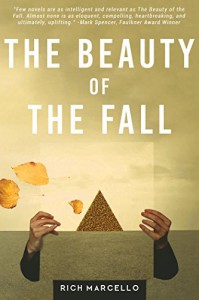The Beauty of the Fall
 If I hadn't won this in a giveaway, I don't think I could have brought myself to finish it.
If I hadn't won this in a giveaway, I don't think I could have brought myself to finish it.This is an example of a book that does several things right and one thing very, very, very wrong - and that one thing keeps happening again and again. Throughout the book, Marcello skips the interesting and compelling parts of the story, and for the life of me I cannot figure out why he chose to do this.
The book begins in medias res, with the protagonist Dan getting fired after having a terrible couple of years. Divorce, the death of his son, the downward spiral of the company he created - all of these things occur before the first page, and for the beginning of a book this is absolutely fine. It's a common and effective way to begin a story, partway through the catalytic action.
The problem with The Beauty of the Fall is that it repeats this technique with every major event throughout the book. We, the reader, never get to see the initial sparks of what become the most important plotlines. Instead, we skip right over them and meet up with Dan again a few months later. We don't get to see him react to these events, or process them, because by the time they're mentioned they're already his new normal.
Probably the most important example is Willow. When she is introduced, it is six months after she and Dan have met and developed a friendship, but the same day that they begin their romantic relationship. Without seeing any of the foundation, those six months they spent getting to know each other, their whole romance is just boring. I don't care. I don't know what truly connects these two very different people, because I didn't get to witness any of their discovery of each other. Even once the romantic relationship begins, we skip ahead again pretty quickly to their decision to move in together. This means that later, when they break up, I have no emotional response. The words on the page tell me that their relationship is meaningful to Dan, but I haven't experienced any of it myself.
Another prominent example is Dan's hallucinations of Zack. When he finally mentions it, he says that they began months earlier. I want to see that. I want to see his reaction to seeing his dead son for the first time. I want to see how he processes it, how he explains it to himself. I want to see how it changes him. Instead, I see Dan already adjusted to this strange new reality - which again lessens the impact and what it's doing to him.
The drinking and cutting got the same treatment. So did the launch of Dan's new company, CW. So did Willow's death. Even smaller scenes suffered from the same malady - repeatedly, conversations with Olivia and the board of directors glossed right over the meat of the debate with a sentence of two of prose. It was entirely frustrating, throughout the book, to feel like I was only being clued in to the best parts of the story well after they happened, as though these crucial plot points were just afterthoughts. It made it impossible to connect with Dan on any meaningful level.
What made it worse was the amount of time spent on messaging that wasn't part of the actual plot. There's nothing wrong with writing a novel with an agenda - but did we need page after page of detailed statistics about climate change, instead of a scene about what was going through Dan's head the first time he hooked up with Katie? Why did Marcello choose to skip over all the most critical turning points in his protagonist's story and yet put so much detail into the process of launching a software startup?
I just couldn't make any sense of it. In the end, it got two stars instead of one just because the story itself has so much potential to be compelling - if only we got to read the actual story and not disjointed retrospective pieces of it sprinkled throughout with philosophical essays tangentially related to the story.





